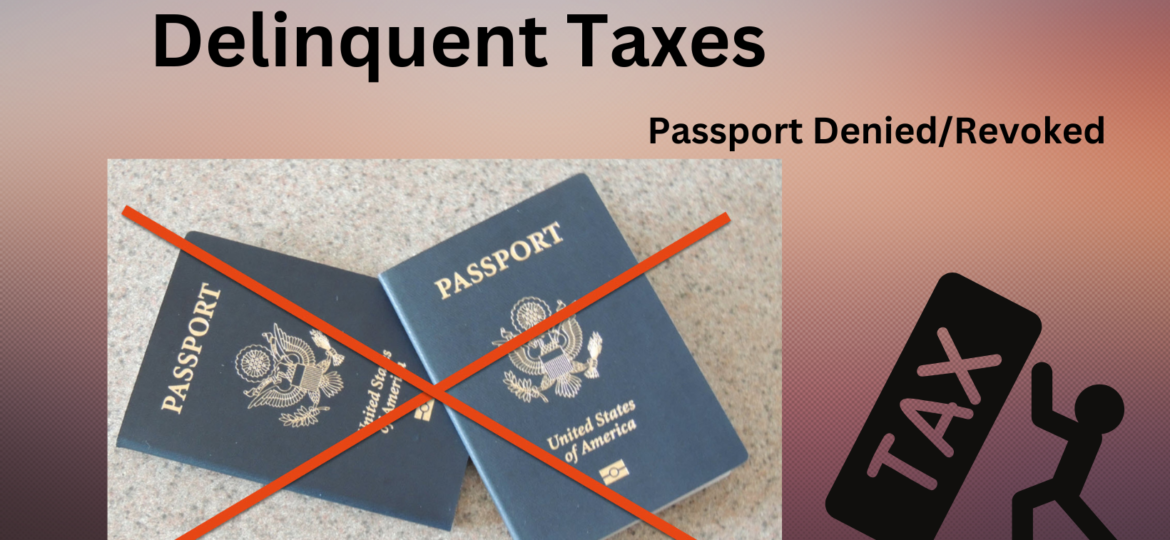
Passport denial for Delinquent Taxes
Are you eagerly planning a trip abroad? Imagine the frustration of having your passport application denied due to outstanding tax debt. This scenario has become a reality for many taxpayers who were shocked to discover that the IRS wields the power to deny or revoke passports for unpaid taxes. Let’s delve into the details and explore your options.
Seriously Delinquent Tax Debt Explained
In 2015, the Fixing America’s Surface Transportation (FAST) Act was enacted, granting the IRS the power to enforce passport denial procedures. Under 26 USC 7345, if IRS notifies the US Department of State that an individual has a seriously delinquent tax debt, then the State Department can deny, revoke, or limit a taxpayer’s passport.
A seriously delinquent tax is unpaid federal taxes (including penalties and interest) exceeding a threshold of $59,000 (adjusted yearly for inflation). These debts can include individual income taxes, Trust Fund Recovery Penalties, and business taxes for which taxpayers are personally liable. It’s important to note that certain types of debts, such as child support and FBAR penalties, are not considered seriously delinquent tax debts.
Tax Debts Not Certified to the State Department
There are several categories of tax debts that are not certified to the State Department. These include debts being timely paid through IRS-approved installment agreements or offers in compromise, settlement agreements with the Department of Justice, and debts for which a Collection Due Process Hearing or innocent spouse relief is requested. The IRS also postpones certification for taxpayers serving in designated combat zones or participating in contingency operations. Tax Attorney, Todd Unger can help you negotiate a back tax plan to enable you to obtain your passport.
How Does Passport Denial Work?
When the IRS certifies a taxpayer’s seriously delinquent tax debt to the State Department, the taxpayer receives a Notice CP508C by regular mail. This notice informs them of the certification and its implications for their passport status. If a taxpayer with a certified tax debt applies for a passport or attempts to renew their existing passport, the State Department will issue a letter and hold their application open for 90 days. During this period, taxpayers can take specific actions to address the certification, such as entering a satisfactory payment arrangement with the IRS or resolving any erroneous certification issues. If you receive a CP 508C letter, then you should immediately contact a tax attorney. Often the best approach to resolving back taxes that are classified as seriously delinquent is to respond to the IRS immediately.
Resolving Your Passport Denial
Taxpayers facing passport denial due to seriously delinquent tax debts have several options to resolve the situation. These include making full payment of the tax debt, filing bankruptcy, negotiating a payment plan with the IRS, or pursuing alternative options like an Offer in Compromise or innocent spouse relief. Seeking professional assistance from a tax attorney is highly recommended to navigate the complexities of the process and explore the best course of action.
Expedited Reversal of Certification
If you have imminent travel plans, then you may qualify for expedited reversal of certification. The Law Offices of Todd S. Unger can help provide the necessary documentation to help expedite the decertification process. If successful, then the IRS will grant the renewal of your passport in a timely manner.
Referral for Passport Revocation
In certain cases, the IRS may recommend passport revocation if a taxpayer fails to fulfill payment promises or does not utilize offshore activities or interests to settle their debt. Before making a revocation referral to the State Department, the IRS will send Letter 6152, giving the taxpayer an opportunity to resolve their account within 30 days.
Judicial Review and Your Rights:
Taxpayers have the right to seek judicial review if they believe their certification is erroneous or if the IRS failed to reverse the certification when required. Filing a suit in the U.S. Tax Court or a U.S. District Court can determine the validity of the certification. It’s important to note that the court cannot release a lien or levy or award monetary damages in such cases.
Reinstate Your Passport Today
If you are a New York, New Jersey, or Pennsylvania resident with a passport denial or revocation due to seriously delinquent tax debts, the Law Offices of Todd S. Unger, Esq. LLC can help. The Law Office of Todd S. Unger is a law firm devoted exclusively to resolving individual and business tax disputes. Contact the Law Office of Todd S. Unger, Esq. LLC today at (877) 544-4743.







